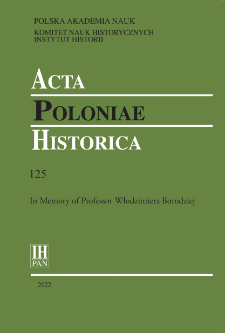- Search in all Repository
- Literature and maps
- Archeology
- Mills database
- Natural sciences
Advanced search
Advanced search
Advanced search
Advanced search
Advanced search

Object
Title: The ‘Righteous’ as an Element of Transnational Memory Politics: The Stockholm International Forum on the Holocaust and the Memory of the Rescue of Jews during the Second World War
Subtitle:
Acta Poloniae Historica T. 125 (2022), In Memory of Professor Włodzimierz Borodziej
Institutional creator:
Polska Akademia Nauk. Komitet Nauk Historycznych
;
Polska Akademia Nauk, Instytut Historii im. Tadeusza Manteuffla
![]()
Contributor:
Institute of History of the Polish Academy of Sciences
Publisher:
Instytut Historii Polskiej Akademii Nauk
Place of publishing:
Description:
Abstract:
In the last two decades, the topic of help given to Jews during the Second World War has experienced an extraordinary boom in Europe and beyond. Transnational and intergovernmental organisations such as the Council of Europe, the European Parliament and the International Holocaust Remembrance Alliance (IHRA) have played an essential role in promoting this subject. This paper shows that the first big event to introduce the category of the Righteous into transnational memory politics was the Stockholm International Forum on the Holocaust (2000). Researchers have described the conference as a significant step toward the ‘institutionalisation of a European memory’ and promoting a self-critical, victim-centred, future-oriented and highly personalised Holocaust remembrance. I argue that it was precisely the universalisation of the Holocaust and the notion of a wide-ranging implication of European societies in the genocide, which paved the way for the rescue narratives. However, as this paper demonstrates, the participants in the conference defined the Righteous differently and invoked them for divergent purposes.
References:
Allwork Larissa, Holocaust Remembrance between the National and the Transnational: The Stockholm International Forum and the First Decade of the International Task Force (London et al., 2015)
Gensburger Sarah, ‘La diffusion transnationale de la catégorie de “Juste Parmi les Nations”. (Re)penser l’articulation entre diffusion des droits de l’homme et globalisation de la mémoire’, Revue internationale de politique comparée, xxii, 4 (2015), 537–55
Gensburger Sarah, National Policy, Global Memory. The Commemoration of the “Righteous” from Jerusalem to Paris, 1942–2007 (New York–Oxford, 2016)
Levy Daniel and Natan Sznaider, Erinnerung im Globalen Zeitalter. Der Holocaust (Frankfurt, 2001)
Levy Daniel and Natan Sznaider, ‘Memory Unbound. The Holocaust and the Formation of Cosmopolitan Memory’, European Journal of Social Theory, v, 1 (2002), 87–106
Kroh Jens, Transnationale Erinnerung. Der Holocaust im Fokus geschichtspolitischer Initiativen (Frankfurt–New York, 2008)
Kroh Jens, ‘Erinnerungskultureller Akteur und geschichtspolitisches Netzwerk: Die Task Force for International Cooperation on Holocaust Education, Remembrance und Research’, in Jan Eckel and Claudia Moisel (eds), Universalisierung des Holocaust? Erinnerungskultur und Geschichtspolitik in internationaler Perspektive. Beiträge zur Geschichte des Nationalsozialismus, 24 (Göttingen 2008), 156–73
Sierp Aline, History, Memory and Trans-European Identity. Unifying Divisions (New York–London, 2014)
Sierp Aline, ‘Integrating Europe, Integrating Memories: The EU’s Politics of Memory since 1945’, in Lucy Bond and Jessica Rapson (eds), The Transcultural Turn: Interrogating Memory Between and Beyond Borders (Berlin, 2014), 103–18
Wóycicka Zofia, ‘A Global Label and its Local Appropriations. Representations of the Righteous Among the Nations in Contemporary European Museums’, Memory Studies, xv, 1 (Feb. 2022), 20–36.
Relation:
Volume:
Start page:
End page:
Detailed Resource Type:
Format:
Resource Identifier:
oai:rcin.org.pl:235877 ; 2450-8462 ; 0001-6829 ; 10.12775/APH.2022.125.06
Source:
IH PAN, sygn. A.295/125 Podr. ; IH PAN, sygn. A.296/125 ; click here to follow the link
Language:
Rights:
Creative Commons Attribution BY-ND 4.0 license
Terms of use:
Copyright-protected material. [CC BY-ND 4.0] May be used within the scope specified in Creative Commons Attribution BY-ND 4.0 license, full text available at: ; -
Digitizing institution:
Institute of History of the Polish Academy of Sciences
Original in:
Library of the Institute of History PAS
Projects co-financed by:
Access:
Object collections:
- Digital Repository of Scientific Institutes > Partners' collections > Institute of History PAS > Serials
- Digital Repository of Scientific Institutes > Partners' collections > Institute of History PAS > Institute Publications
- Digital Repository of Scientific Institutes > Partners' collections > Institute of History PAS > Institute Publications > Journals
- Digital Repository of Scientific Institutes > Partners' collections > Institute of History PAS > Institute Publications > Journals > Acta Poloniae Historica
- Digital Repository of Scientific Institutes > Literature > Journals/Articles
Last modified:
Sep 22, 2023
In our library since:
Aug 14, 2022
Number of object content downloads / hits:
50
All available object's versions:
https://rcin.org.pl./publication/272508
Show description in RDF format:
Show description in RDFa format:
Show description in OAI-PMH format:
Objects Similar
Wóycicka, Zofia
Wóycicka, Zofia Wawrzyniak, Joanna (1975– ) Saryusz-Wolska, Magdalena (1980– )

 INSTYTUT ARCHEOLOGII I ETNOLOGII POLSKIEJ AKADEMII NAUK
INSTYTUT ARCHEOLOGII I ETNOLOGII POLSKIEJ AKADEMII NAUK
 INSTYTUT BADAŃ LITERACKICH POLSKIEJ AKADEMII NAUK
INSTYTUT BADAŃ LITERACKICH POLSKIEJ AKADEMII NAUK
 INSTYTUT BADAWCZY LEŚNICTWA
INSTYTUT BADAWCZY LEŚNICTWA
 INSTYTUT BIOLOGII DOŚWIADCZALNEJ IM. MARCELEGO NENCKIEGO POLSKIEJ AKADEMII NAUK
INSTYTUT BIOLOGII DOŚWIADCZALNEJ IM. MARCELEGO NENCKIEGO POLSKIEJ AKADEMII NAUK
 INSTYTUT BIOLOGII SSAKÓW POLSKIEJ AKADEMII NAUK
INSTYTUT BIOLOGII SSAKÓW POLSKIEJ AKADEMII NAUK
 INSTYTUT CHEMII FIZYCZNEJ PAN
INSTYTUT CHEMII FIZYCZNEJ PAN
 INSTYTUT CHEMII ORGANICZNEJ PAN
INSTYTUT CHEMII ORGANICZNEJ PAN
 INSTYTUT FILOZOFII I SOCJOLOGII PAN
INSTYTUT FILOZOFII I SOCJOLOGII PAN
 INSTYTUT GEOGRAFII I PRZESTRZENNEGO ZAGOSPODAROWANIA PAN
INSTYTUT GEOGRAFII I PRZESTRZENNEGO ZAGOSPODAROWANIA PAN
 INSTYTUT HISTORII im. TADEUSZA MANTEUFFLA POLSKIEJ AKADEMII NAUK
INSTYTUT HISTORII im. TADEUSZA MANTEUFFLA POLSKIEJ AKADEMII NAUK
 INSTYTUT JĘZYKA POLSKIEGO POLSKIEJ AKADEMII NAUK
INSTYTUT JĘZYKA POLSKIEGO POLSKIEJ AKADEMII NAUK
 INSTYTUT MATEMATYCZNY PAN
INSTYTUT MATEMATYCZNY PAN
 INSTYTUT MEDYCYNY DOŚWIADCZALNEJ I KLINICZNEJ IM.MIROSŁAWA MOSSAKOWSKIEGO POLSKIEJ AKADEMII NAUK
INSTYTUT MEDYCYNY DOŚWIADCZALNEJ I KLINICZNEJ IM.MIROSŁAWA MOSSAKOWSKIEGO POLSKIEJ AKADEMII NAUK
 INSTYTUT PODSTAWOWYCH PROBLEMÓW TECHNIKI PAN
INSTYTUT PODSTAWOWYCH PROBLEMÓW TECHNIKI PAN
 INSTYTUT SLAWISTYKI PAN
INSTYTUT SLAWISTYKI PAN
 SIEĆ BADAWCZA ŁUKASIEWICZ - INSTYTUT TECHNOLOGII MATERIAŁÓW ELEKTRONICZNYCH
SIEĆ BADAWCZA ŁUKASIEWICZ - INSTYTUT TECHNOLOGII MATERIAŁÓW ELEKTRONICZNYCH
 MUZEUM I INSTYTUT ZOOLOGII POLSKIEJ AKADEMII NAUK
MUZEUM I INSTYTUT ZOOLOGII POLSKIEJ AKADEMII NAUK
 INSTYTUT BADAŃ SYSTEMOWYCH PAN
INSTYTUT BADAŃ SYSTEMOWYCH PAN
 INSTYTUT BOTANIKI IM. WŁADYSŁAWA SZAFERA POLSKIEJ AKADEMII NAUK
INSTYTUT BOTANIKI IM. WŁADYSŁAWA SZAFERA POLSKIEJ AKADEMII NAUK


































